READER COMMENTS ON
"POW!: Greenwald Defends His Blockbuster NatSec Documents Journalism on MSNBC [VIDEO]"
(32 Responses so far...)
COMMENT #1 [Permalink]
...
Gus Wynn
said on 6/8/2013 @ 7:54 am PT...
I think Obama is a very conflicted man and a great example of what happens when a well intentioned elected official crashes into the corrupting, power mad, anti-populist influence in DC.
Obama has been buffeted by banks, war hawks, big oil, big pharma, lobbies and Monsanto, making him a shell of himself and a walking contradiction.
I remember a speech in which Obama addressed the disappointment in his policies. He said "MAKE ME", challenging the public to act.
Greenwald is the perfect messenger to remind Obama that he has abandoned his primary oath, to protect the Constitution. Even if you believe a spate of terror attacks require we trade civil liberties for greater security, you still have to change the law first. And even the hypocritical right is getting on board.
COMMENT #2 [Permalink]
...
Ernest A. Canning
said on 6/8/2013 @ 8:21 am PT...
Gus Wynn wrote:
I think Obama is a very conflicted man and a great example of what happens when a well intentioned elected official crashes into the corrupting, power mad, anti-populist influence in DC.
Why do people keep offering excuses for someone whose actions have never matched his lofty rhetoric?
Obama occupies the most powerful office in the world. No one held a gun to his head, forcing him to abandon the rule of law in favor of endless war and secret surveillance. No one prevented Obama or the Attorney General from seeking to prosecute the banksters.
Obama was not, as you claim, "buffeted" by the pharmaceutical industry. Instead, he invited the executives of the pharmaceutical and healthcare insurance industries to the White House to map out his signature accomplishment of his first term --- The Affordable Care Act (aka Obamacare) --- a bill that was drafted by a former Wellpoint VP.
Obama deliberately chose to shut single-payer advocates out of the process.
As Dr. Quintin Young, a long-time personal friend of the President observed at the time, Obama had been "dishonest" on the topic of single-payer. Young was especially troubled that Obama could acknowledge that private insurers are the problem yet come up with a solution that "enhances the insurer presence" by compelling everyone to buy insurance, with expensive subsidies flowing to the carriers --- at a cost of $900 billion over ten years.
What is it going to take to convince the "true believers" amongst those who voted for Obama that the President has never been the victim of circumstance; that his deeds will never match his soaring rhetoric because that rhetoric amounted to empty promises that he never intended to fulfill?
COMMENT #3 [Permalink]
...
Ernest A. Canning
said on 6/8/2013 @ 8:50 am PT...
Greenwald's observations about the purpose of the First Amendment are in line with those offered by Justice Hugo Black, in his concurring opinion in New York Times vs. United States (the "Pentagon Papers" case) [emphasis added]:
In the First Amendment the Founding Fathers gave the free press the protection it must have to fulfill its essential role in our democracy. The press was to have served the governed, not the governors. The Government's power to censor the press was abolished so that the press would remain forever free to censure the Government. The press was protected so that it could bare the secrets of government and inform the people. Only a free and unrestrained press can effectively expose deception in government. And paramount among the responsibilities of a free press is the duty to prevent any part of the government from deceiving the people and sending them off to distant lands to die…
COMMENT #4 [Permalink]
...
Ernest A. Canning
said on 6/8/2013 @ 9:49 am PT...
The one thing that should not be overlooked in these ominous intrusions is the role played by the right wing majority of the Supreme Court, especially in light of the ACLU's failed effort to challenge "the system of warrantless surveillance initiated by the George W. Bush administration and embraced by the Obama administration."
The Court's right wing majority rejected a challenge to the 2008 amendment to FISA because, according to the Federalist Society connected majority, those challenging the Act (attorneys and journalists) could "only speculate on how the attorney general and the director of national intelligence will exercise their discretion in determining which communications to target."
Those attorneys and journalists were forced to speculate because the decisions by the AG and intelligence communities are cloaked in secrecy.
Greenwald's references to past abuses, such as the FBI's targeting of dissidents like Martin Luther King, reveal why trusting government agencies to do the right thing in private amounts to an exercise of blind faith that could prove the harbinger of a totalitarian state.
Interesting that it was the right wing of the Supreme Court which was willing to turn a blind eye towards this type of big government intrusion.
So Steve Snyder, what do you have to say about that? I look forward to your effort to spin that as simply the product of the Obama administration.
COMMENT #5 [Permalink]
...
Ernest A. Canning
said on 6/8/2013 @ 10:18 am PT...
See, Norman Soloman's Open Letter to Dianne Feinstein.
"One of the most chilling parts of that just-revealed Surveillance Court order can be found at the bottom of the first page, where it says “Declassify on: 12 April 2038.”
Apparently you thought—or at least hoped—that we, the people of the United States, wouldn’t find out for 25 years. And the fact that we learned about this extreme violation of our rights in 2013 instead of 2038 seems to bother you a lot."
COMMENT #6 [Permalink]
...
Brad Friedman
said on 6/8/2013 @ 11:53 am PT...
Ernie -
After a quick read of your thoughts above, the only objection that I'd offer was to this:
[Obama's] deeds will never match his soaring rhetoric because that rhetoric amounted to empty promises that he never intended to fulfill
Of course, we have no idea what he "intended to fulfill" or not. We'd have to get into his mind to know if he was disingenuous in his rhetoric and deeds before he was elected, or if something changed afterward.
But, where folks may not remember, he DID vote to give immunity to the telecom companies in the 2008 bill that legalized the warrantless wiretapping that the Bush Admin had been doing for years unlawfully.
COMMENT #7 [Permalink]
...
Sunil Thacker
said on 6/8/2013 @ 1:23 pm PT...
"But, where folks may not remember, he DID vote to give immunity to the telecom companies in the 2008 bill that legalized the warrantless wiretapping that the Bush Admin had been doing for years unlawfully."
I wouldn't agree less with the above statement.
COMMENT #8 [Permalink]
...
nswfm
said on 6/8/2013 @ 2:25 pm PT...
Thank you guys for reminding people about the public servant, private individual. I think some of those "corporations are people, my friend" need to be thrown in jail.
COMMENT #9 [Permalink]
...
Ernest A. Canning
said on 6/8/2013 @ 3:18 pm PT...
Re Brad @6,
I think my dad would have had an apropos response to that.
He advised me to watch what people do; not what they say.
Obama's deeds, dating back to that Senate vote to authorize the Bush illegal surveillance provides prima facie evidence of his intent.
Also, if we had to actually get into people's minds to ascertain intent, no one who failed to confess could ever be convicted of murder, for the crime requires a finding of intent.
COMMENT #10 [Permalink]
...
Dredd
said on 6/8/2013 @ 3:59 pm PT...
The use of the word "coup" is being used by decent folks who were once officials but who are now citizens.
They use it to describe the change.
COMMENT #11 [Permalink]
...
Dredd
said on 6/8/2013 @ 4:57 pm PT...
Who remembers us talking about this here on Brad Blog in 2005 (7-8 yrs ago):
"If you made a phone call today or sent an e-mail to a friend, there's a good chance what you said or wrote was captured and screened by the country's largest intelligence agency. The top-secret Global Surveillance Network is called Echelon, and it's run by the National Security Agency and four English-speaking allies: Canada, Great Britain, Australia and New Zealand.
The mission is to eavesdrop on enemies of the state: foreign countries, terrorist groups and drug cartels. But in the process, Echelon's computers capture virtually every electronic conversation around the world."
(link here).The link in that comment is now broken, so here is the link to a Feb. 27, 2000 Sixty Minutes Program talking about that "conspiracy theory."
Ah, the good olde days are still with us.
COMMENT #12 [Permalink]
...
Brad Friedman
said on 6/8/2013 @ 6:05 pm PT...
Ernest @ 9 said:
if we had to actually get into people's minds to ascertain intent, no one who failed to confess could ever be convicted of murder, for the crime requires a finding of intent.
Well, counselor, by that logic, if I decide to murder you next year, I have, therefore, retroactively, "intended" to do it along?
If someone gets in a fight with his wife, goes to Walmart to buy a gun, comes back home, points the gun at his wife and pulls the trigger and kills her, we can safely say he intended to, at the very least, shoot her and probably murder her (something we would determine from his motivation, and the witnesses who testified that they had been fighting before the shot went off.)
None of that, of course, means the guy had "intended" to murder her when they got married years earlier.
Your witness, counselor.
COMMENT #13 [Permalink]
...
Ernest A. Canning
said on 6/8/2013 @ 8:08 pm PT...
Bad analogy Brad.
First, the question of whether the President has been insincere is not a criminal matter and does not require proof beyond a reasonable doubt.
Intent is determined based upon the totality of the evidence. Five years of a consistently significant gap between the rhetoric and performance preponderates in favor of the conclusion that the lofty rhetoric lacked sincerity.
If we are deciding this on a preponderance of evidence, I believe the evidence to support the conclusion that Obama is simply a well-intentioned individual who has been thwarted by the right is sorely lacking.
The evidence of bad faith embodied in the failure of this administration to prosecute its predecessors for war crimes, the refusal to meet with single payer advocates while meeting personally with executives from the pharmaceutical and health insurance industries, and the attempt to advance a chained CPI on Social Security right after an election was won because he promised not to touch Social Security and a host of other issues is overwhelming.
It is simply unreasonable to maintain otherwise.
COMMENT #14 [Permalink]
...
Brad Friedman
said on 6/8/2013 @ 10:18 pm PT...
Ernie -
No, not a bad analogy, just one that doesn't suit your argument, which implies that nothing changed between the time he was running for President and the time he became President. Like, say, this for example: https://bradblog.com/?p=7408
Mind you, I'm not arguing what were his intentions, one way or another, because I don't know. So this is not "excuse making", this is just a response to what we know and what we don't. You argument may be compelling but it's hardly dispositive.
"No one held a gun to his head, forcing him to abandon the rule of law in favor of endless war and secret surveillance."
Given the link above, that may or may not be true. The jury (me), at this time, remains unconvinced.
COMMENT #15 [Permalink]
...
Dredd
said on 6/9/2013 @ 4:30 am PT...
The Animals were on to something once upon a time:
"I'm just a soul whose intentions are good, Oh Lord! please don't let me be misunderstood."
(Don't Let Me Be Misunderstood). Lord Acton long ago warned about the mysterious ability of power ... its power to corrupt (Toxins of Power). When a person goes into power with good intentions, that is not the end of the matter.
COMMENT #16 [Permalink]
...
Robert
said on 6/9/2013 @ 8:17 am PT...
Hey thanks Brad and Ernie for that really enlightening article and conversation, one of the first sane and articulate so far that I have found on the net...I don't have NSA clearance yet, so I can't say anything about your phone calls...
COMMENT #17 [Permalink]
...
Ernest A. Canning
said on 6/9/2013 @ 8:29 am PT...
Brad:
Ray McGovern’s speculation that Obama may have shied away from war crimes prosecutions out of fear of the CIA does not provide a compelling case --- especially not when measured against the broad array of issues --- many, such as the chained CPI for Social Security benefits that have nothing to do with the CIA --- in which the deeds of President Obama stand in stark contrast to the rhetoric of Candidate Obama. Moreover, there are, as you are undoubtedly aware, those who claim Obama had past ties to the CIA.
And then there was the point I made in Plumbing the Depths of Lawless Executive Depravity:
When you examine the vast chasm between deeds of President Obama with respect to a wide array of issues, both foreign and domestic, and the substance of Candidate Obama's lofty rhetoric, the only reasonable conclusion is that the rhetoric was intended to deceive.
With all due respect, an effort to suggest that Candidate Obama's soaring rhetoric was anything less than deceptive is patently unreasonable.
There may be a few hold out jurors (you), but their holding out is not based on facts or reason.
COMMENT #18 [Permalink]
...
Dredd
said on 6/9/2013 @ 8:33 am PT...
There is a FISA court ruling holding that the government violated the 4th Amendment ... but the DOJ is fighting its release (Mother Jones).
So Glenn Greenwald was correct when he stood up.
COMMENT #19 [Permalink]
...
Ernest A. Canning
said on 6/9/2013 @ 8:47 am PT...
Dredd: Thanks for the link to the Mother Jones article.
The article not only reflects that the FISA court found a 4th Amendment violation with respect to one of the NSA programs, but revealed why, with respect to the public's right to know, Congressional oversight is essentially worthless.
This important case—all the more relevant in the wake of this week's disclosures—was triggered after Sen. Ron Wyden (D-Ore.), a member of the Senate intelligence committee, started crying foul in 2011 about US government snooping. As a member of the intelligence committee, he had learned about domestic surveillance activity affecting American citizens that he believed was improper. He and Sen. Mark Udall (D-Colo.), another intelligence committee member, raised only vague warnings about this data collection, because they could not reveal the details of the classified program that concerned them.
What we have is a situation in which the government not only violates the 4th Amendment but in which the government claims a right to do so without the public ever learning about the violation.
COMMENT #20 [Permalink]
...
Dredd
said on 6/9/2013 @ 9:30 am PT...
Ernie,
You are welcome.
On "This Week with George S", Glenn Greenwald says for us to expect more from him ... more revelations about DOJ shenanigans.
COMMENT #21 [Permalink]
...
karenfromillinois
said on 6/9/2013 @ 10:37 am PT...
COMMENT #22 [Permalink]
...
karenfromillinois
said on 6/9/2013 @ 10:41 am PT...
Mark Klein, an AT&T engineer and witness in the EFF's case against the company �
by Nate Anderson - Apr 12 2006, 11:55am CDT
The EFF's case against AT&T has barely begun, yet it has already brought to light some fascinating details about the methods behind the NSA's alleged wiretapping abilities. Mark Klein, a retired AT&T engineer who is now participating in the case as a witness, has released a statement to the media in which he outlines many of the allegations that are currently under seal. Chief among them is his claim that AT&T installed powerful traffic monitoring equipment in a "secret room" in their San Francisco switching office at the behest of the NSA.
"In 2002, when I was working in an AT&T office in San Francisco, the site manager told me to expect a visit from a National Security Agency agent, who was to interview a management-level technician for a special job. The agent came, and by chance I met him and directed him to the appropriate people.
In January 2003, I, along with others, toured the AT&T central office on Folsom Street in San Francisco�actually three floors of an SBC building. There I saw a new room being built adjacent to the 4ESS switch room where the public's phone calls are routed. I learned that the person whom the NSA interviewed for the secret job was the person working to install equipment in this room. The regular technician work force was not allowed in the room."
According to Klein, this room contained (among other things) a Narus STA 6400 traffic analyzer into which all of AT&T's Internet and phone traffic was routed; Klein himself helped wire the splitter box that made this possible. In addition to AT&T's own traffic, Klein alleges that the company also routed its peering links into the splitter, meaning that any traffic that passed through AT&T's own network could be scanned. Futhermore, San Francisco wasn't the only place such secret rooms were built; Klein claims that AT&T offices in Seattle, San Jose, Los Angeles, and San Diego also have them.
COMMENT #23 [Permalink]
...
karenfromillinois
said on 6/9/2013 @ 11:30 am PT...
the ability to scan(copy)every communication is clearly a fishing trip,the assurances of clapper that,o we would never do that fall in the "trust me" catagory defense which is unAmerican...the current pres says,dont worry the Reps u voted for approved this,but since "we the people" are not allowed to oversee the actual counting of our votes this is also a false defense
imagine the cost of all this spying while our bridges crumble and our children's schools are closed
and i believe these reports glenn has so bravely brought to light are just the tip of the iceberg,i believe that certain calls and emails are interfered with(even when there is no criminal activity)
and dont forget bradley manning is currently on trial for exposing war crimes our govt committed
COMMENT #24 [Permalink]
...
Davey Crocket
said on 6/9/2013 @ 12:57 pm PT...
Well, I enjoy the back and forth between Ernie and Brad, I posit the issue is much much deeper than Obama, Bush, or the next president.
I am sure you have all seen the latest release from Greenwald but I will post it just in case.
http://www.guardian.co.u...istleblower-surveillance
If this does not scare the shit out of you, nothing will.
Davey has generally been at odds with the bragbloggians, but I think that this is one in which we can be in solidarity.
COMMENT #25 [Permalink]
...
David Lasagna
said on 6/9/2013 @ 2:49 pm PT...
Dear Ernie,
Very interesting reading two of my faves going back and forth here. For what it's worth(if I'm understanding everyone correctly), I'm with Brad on this one.
I think what Brad's saying is that speaking to anyone's motivation, without more info than we can have without speaking directly to that person, is a dicey business, at best.
I'm completely with you on the chasm of disparity between Obama's words and deeds. But having in my own life witnessed equally disconcerting disconnects between friends' firmly stated intentions, clearly stated commitments, and subsequent deeds, I have come to the opinion that this sort of dichotomy between words and deeds may unfortunately be almost standard issue for a culture as generally disconnected as ours.
For me, in this case, it's not impossible to imagine that Obama actually BELIEVES a lot of his dissembling.
I think it's not impossible to imagine that with all the unimaginable peer pressure that comes with being president, that without a healthy revolutionary or anarchist streak in your soul, it could be fairly easy to lose one's way.
Not to say that I can speak to what Obama's "way" is or ever was. I've always suspected he wasn't as progressive as he portrayed himself to be. I think he was pretty cozy with the nuclear power industry as a state senator. To me that suggests a certain cluelessness.
Then again, there is rampant cluelessness in Washington. We all know the disconnect between voting requirements for a functioning democracy and the vast ignorance on this most vital subject of the majority of our representatives. In another maddening case recently many liberals, that you'd hope might know better, voted against recent GMO labeling requirements legislation. Warren and Franken to name but two.
I'm saying I suspect there is a multi-faceted, multi-layered disconnecting effect experienced by those in power(and everyone else) in this crazy country.
I love the movie "Dave" cuz it puts into film fantasy what I think could actually manifest. A simple, honest man finds himself at the reins of power and because he doesn't understand "better" he just starts doing the right thing. "Bulworth" was another variation of the same theme.
But it seems to me for most of the inhabitants of the Washington bubble truly creative thinking simply does not appear possible.
I see it, in part, as a giant failure of imagination of our "leaders". They just can't imagine really doing the right thing cuz they are overwhelmed by all the forces they know are lined up against doing it. Real politic. That's why it's up to us. That's why it's so exciting and inspiring witnessing Medea Benjamin and Glenn Greenwald's challenges in the last few weeks.
love,
Dave
(My apologies if this is not the most coherent comment. Very tired. But wanted to throw my two cents in.)
COMMENT #26 [Permalink]
...
Dredd
said on 6/9/2013 @ 2:52 pm PT...
Yes, I watched the 29 year old explain why he put his and Glenn's life in jeopardy FOR US.
"Davey has generally been at odds with the bragbloggians, but I think that this is one in which we can be in solidarity."
They can only hang us individually.
Together we stand.
COMMENT #27 [Permalink]
...
Ernest A. Canning
said on 6/9/2013 @ 6:46 pm PT...
David Lasagna @25 wrote:
it's not impossible to imagine that Obama actually BELIEVES a lot of his dissembling.
Setting aside the absence of any evidence that Obama is delusional and out of touch with reality --- which is essentially what would be required for that belief to be accurate --- the issue, David, is not whether it is possible that Candidate Obama actually believed what he said during the two successive campaigns.
Anything is possible!
The issue is whether it is reasonable to conclude, that there was an absence of an intent to deceive given the totality of the evidence of that vast gap between rhetoric and policy on such a wide array of issues.
And let's narrow it down to just one of those issues --- healthcare. How can any of us who does not know the President personally dispute the statement made by Dr. Quintin Young, a long-time personal friend of the President, that the President had been "dishonest" about single-payer?
In California, we have a civil jury instruction to the effect that if you find a witness to have been willfully false about any aspect of his or her testimony, that witness is to be distrusted with regard to all other aspects of the witness's testimony.
You concede, David, that there is a "chasm of disparity between Obama's words and deeds." How wide does that chasm have to be and on how vast array of issues before you reach the conclusion that this President's sincerity is sorely lacking?
COMMENT #28 [Permalink]
...
John Washburn
said on 6/10/2013 @ 12:36 pm PT...
Glen so nailed it:
As an American Citizen I ( Brad, you, anyone) have the unassailable (dare I say inalienable) right to report to my fellow citizens what the US government is doing
"The Press" is not MSNBC, ?CNN, FOX, CBS, the Guardian, the NY Time, etc. The press protected by the six rights enumerated in the first amendment is first and foremost the individual and secondarily the associations formed in order to transmit that information; e.g. blogs, chat rooms, personal websites, and if you are desperate the Lame Stream media outlets mentioned earlier.
COMMENT #29 [Permalink]
...
Randy D
said on 6/10/2013 @ 1:14 pm PT...
On the motives discussion, my problem with Ernest's framing is that it gives way to much weight to individual agency and too little to structure of the national security state. This President and ANY PRESIDENT are more changed and controlled by the state bureaucracy than the other way around.
The clearest example is Jimmy Carter. We now have over 30 years of evidence of what a nice guy Carter is, humbly committed to public and community service. And yet, if you examine his record as President, he fueled the nuclear arms race, promoted dictatorships in Central America, used the CIA to create the Taliban, etc.
That's the nature of the beast. Even the best Presidential candidate will betray us. We should resist, but it makes little sense to blame the individual politician. I expect that when Obama's term is over, he will be a great ex-President like Carter, and not a do nothing embarrassment with Bush.
COMMENT #30 [Permalink]
...
David Lasagna
said on 6/10/2013 @ 2:01 pm PT...
I don't know what to tell you, Ernie.
In the personal realm it has been my astonishing experience to have sacred trusts betrayed. There was every bit as huge a disparity between my friends' words and their actions.
But I KNOW they were not consciously trying to fuck me over. They were lost in their own timewarp unconsciously stuck on their own history channel.
In addition, many conversations with people of differing political persuasions have shown me again and again, example after example of magical thinking. I dare say I know no one who doesn't engage in it at some time about something.
So in this, and in many other public political cases like this, without being able to really know, THAT is the sort of explanation that seems most likely to me. I think it much more likely that people are being unconsciously duplicitous than that they are consciously conniving.
This is not to say that there is not tons of conscious conniving. There is. But my guess is that even when there is conscious conniving there is simultaneously a bubble of magic thinking by which the duplicity is rationalized.
There's some great quote by Orwell pertaining to this kind of thing. Something about the need to be fully conscious of what your doing because the deeds being done require that, but then an immediate sort of amnesia is also required for otherwise the person could not live with themself.
I've wondered about this motivation question for decades. The Orwell quote is the thing that sounds the closest to me so far.
In any case, whatever the internal motivation the results are much the same. The only reason it might matter, to my way of thinking, is in the faint hope that the more accurate the guess as to someone's motivation, the more helpful the guess may be in coming up with some sort of strategy of words and/or actions to try to pop all the magic thinking bubbles.
COMMENT #31 [Permalink]
...
Ernest A. Canning
said on 6/10/2013 @ 6:50 pm PT...
Randy D wrote @
On the motives discussion, my problem with Ernest's framing is that it gives way to much weight to individual agency and too little to structure of the national security state.
So, Randy, did the "structure of the national security state" force Obama to lie about "single-payer?" Did it compel him to shut out single-payer advocates as he met privately with the heads of the health insurance and pharmaceutical industries?
Did the "structure of the national security state" force Obama to advocate a chained CPI when even the conservative Democrats in the Senate opposed it?
COMMENT #32 [Permalink]
...
Floridiot
said on 6/11/2013 @ 7:36 am PT...
This surveillance state is the 'Manure Doctrine', a strain of the 'Monroe Doctrine' brought about by advances in technology/MIC power....


 Trump Admin's Endless Waste, Fraud, Abuse on Voting, at DOJ, by DOGE: 'BradCast' 1/20/26
Trump Admin's Endless Waste, Fraud, Abuse on Voting, at DOJ, by DOGE: 'BradCast' 1/20/26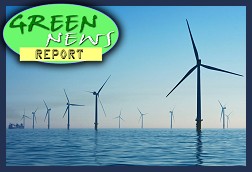 'Green News Report' 1/20/26
'Green News Report' 1/20/26
 Sunday 'Domestic Terrorist' Toons
Sunday 'Domestic Terrorist' Toons 'A Cornered Rat is a Dangerous Rat': Trump Terrorizes Minn., Menaces NATO, World: 'BradCast' 1/15/26
'A Cornered Rat is a Dangerous Rat': Trump Terrorizes Minn., Menaces NATO, World: 'BradCast' 1/15/26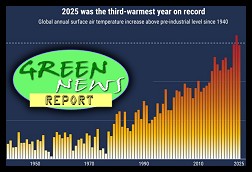 'Green News Report' 1/15/26
'Green News Report' 1/15/26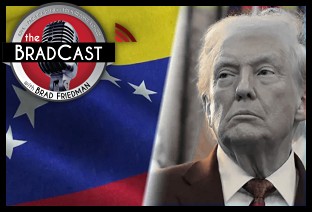 'This Isn't Close to Over': Mad King Trump in Venezuela (and Beyond): 'BradCast' 1/14
'This Isn't Close to Over': Mad King Trump in Venezuela (and Beyond): 'BradCast' 1/14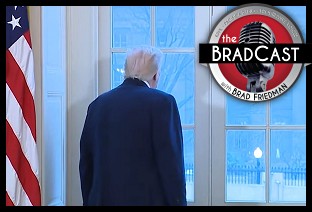 Things Getting Weirder as Trump Keeps Losing: 'BradCast' 1/13/26
Things Getting Weirder as Trump Keeps Losing: 'BradCast' 1/13/26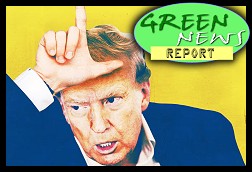 'Green News Report' 1/13/26
'Green News Report' 1/13/26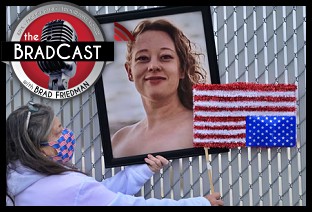 After ICE Murder in MN, Local Cops Disown Fed Policing Practices: 'BradCast' 1/12/26
After ICE Murder in MN, Local Cops Disown Fed Policing Practices: 'BradCast' 1/12/26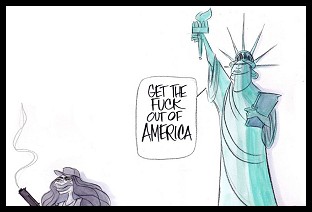 Sunday 'Ice Age' Toons
Sunday 'Ice Age' Toons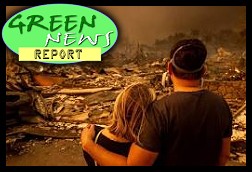 'Green News Report' 1/8/26
'Green News Report' 1/8/26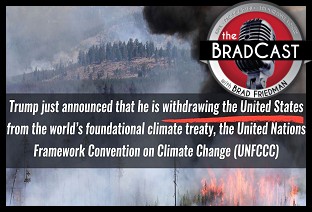 Trump to Congress, Climate, U.N., Rule of Law: DROP DEAD - 'BradCast' 1/8/26
Trump to Congress, Climate, U.N., Rule of Law: DROP DEAD - 'BradCast' 1/8/26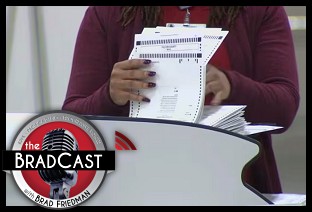 'Nonsense': Trumpers Claim 315k Fraudulent GA Votes in 2020: 'BradCast' 1/7/26
'Nonsense': Trumpers Claim 315k Fraudulent GA Votes in 2020: 'BradCast' 1/7/26 Jack Smith Testimony on Trump J6 Crimes, DOJ Weaponization: 'BradCast' 1/6/26
Jack Smith Testimony on Trump J6 Crimes, DOJ Weaponization: 'BradCast' 1/6/26 Trump War on Venez. is About Ego, Power, 'Alien Enemies Act': 'BradCast' 1/5/26
Trump War on Venez. is About Ego, Power, 'Alien Enemies Act': 'BradCast' 1/5/26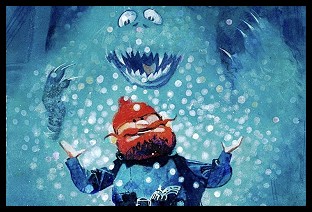 Have a Holly Jolly Somehow
Have a Holly Jolly Somehow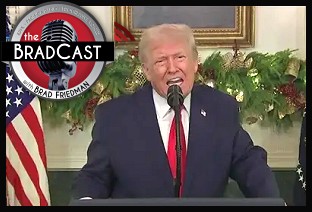 Old Man Shouts at People from WH for 20 Minutes: 'BradCast' 12/18/25
Old Man Shouts at People from WH for 20 Minutes: 'BradCast' 12/18/25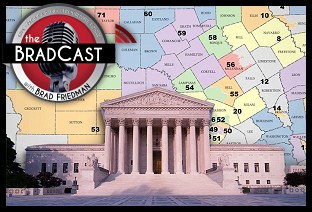 SCOTUS' How-To on Gerrymandering on 'Eve' of Election Year: BradCast' 12/17/25
SCOTUS' How-To on Gerrymandering on 'Eve' of Election Year: BradCast' 12/17/25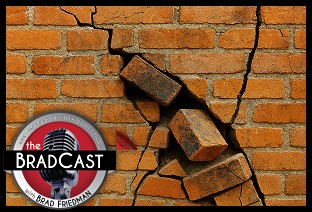 Bricks in the Wall: 'BradCast' 12/16/25
Bricks in the Wall: 'BradCast' 12/16/25
 VA GOP VOTER REG FRAUDSTER OFF HOOK
VA GOP VOTER REG FRAUDSTER OFF HOOK Criminal GOP Voter Registration Fraud Probe Expanding in VA
Criminal GOP Voter Registration Fraud Probe Expanding in VA DOJ PROBE SOUGHT AFTER VA ARREST
DOJ PROBE SOUGHT AFTER VA ARREST Arrest in VA: GOP Voter Reg Scandal Widens
Arrest in VA: GOP Voter Reg Scandal Widens ALL TOGETHER: ROVE, SPROUL, KOCHS, RNC
ALL TOGETHER: ROVE, SPROUL, KOCHS, RNC LATimes: RNC's 'Fired' Sproul Working for Repubs in 'as Many as 30 States'
LATimes: RNC's 'Fired' Sproul Working for Repubs in 'as Many as 30 States' 'Fired' Sproul Group 'Cloned', Still Working for Republicans in At Least 10 States
'Fired' Sproul Group 'Cloned', Still Working for Republicans in At Least 10 States FINALLY: FOX ON GOP REG FRAUD SCANDAL
FINALLY: FOX ON GOP REG FRAUD SCANDAL COLORADO FOLLOWS FLORIDA WITH GOP CRIMINAL INVESTIGATION
COLORADO FOLLOWS FLORIDA WITH GOP CRIMINAL INVESTIGATION CRIMINAL PROBE LAUNCHED INTO GOP VOTER REGISTRATION FRAUD SCANDAL IN FL
CRIMINAL PROBE LAUNCHED INTO GOP VOTER REGISTRATION FRAUD SCANDAL IN FL Brad Breaks PA Photo ID & GOP Registration Fraud Scandal News on Hartmann TV
Brad Breaks PA Photo ID & GOP Registration Fraud Scandal News on Hartmann TV  CAUGHT ON TAPE: COORDINATED NATIONWIDE GOP VOTER REG SCAM
CAUGHT ON TAPE: COORDINATED NATIONWIDE GOP VOTER REG SCAM CRIMINAL ELECTION FRAUD COMPLAINT FILED AGAINST GOP 'FRAUD' FIRM
CRIMINAL ELECTION FRAUD COMPLAINT FILED AGAINST GOP 'FRAUD' FIRM RICK SCOTT GETS ROLLED IN GOP REGISTRATION FRAUD SCANDAL
RICK SCOTT GETS ROLLED IN GOP REGISTRATION FRAUD SCANDAL VIDEO: Brad Breaks GOP Reg Fraud Scandal on Hartmann TV
VIDEO: Brad Breaks GOP Reg Fraud Scandal on Hartmann TV RNC FIRES NATIONAL VOTER REGISTRATION FIRM FOR FRAUD
RNC FIRES NATIONAL VOTER REGISTRATION FIRM FOR FRAUD EXCLUSIVE: Intvw w/ FL Official Who First Discovered GOP Reg Fraud
EXCLUSIVE: Intvw w/ FL Official Who First Discovered GOP Reg Fraud GOP REGISTRATION FRAUD FOUND IN FL
GOP REGISTRATION FRAUD FOUND IN FL

































